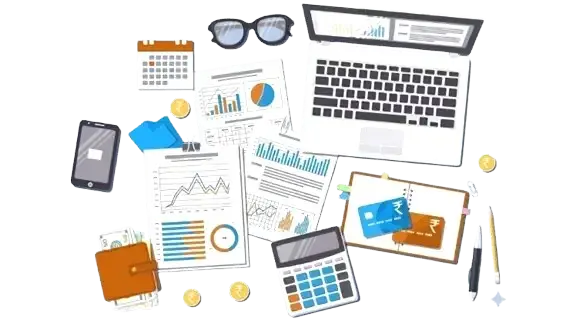Accounting plays a vital role in the financial success of every business, whether small, medium, or large. In simple words, the financial and accounting meaning refers to the process of recording, summarising, analysing, and reporting financial transactions to support business decisions. A well-structured accounting system ensures transparency, compliance, profitability, and long-term growth.
What Are Accounting Services?
Accounting Services include bookkeeping, financial statement preparation, payroll management, tax filing, auditing, and compliance support. These services help businesses track income and expenses, maintain records accurately, and understand overall financial performance. Many companies that want to focus on core operations prefer outsourcing to an accounting firm instead of hiring a full-time internal team.
Types of Accounting
Businesses can choose the right service depending on their size, industry, and compliance needs. The main type of accounting includes:
- Financial Accounting – Preparation of balance sheets, profit & loss statements, and cash flow reports for investors, owners, and stakeholders.
- Managerial Accounting – Internal performance tracking, budgeting, and cost analysis to support management decisions.
- Tax Accounting Services – Calculation and filing of taxes while ensuring compliance with Income Tax and GST laws and optimising tax liability.
- Cost Accounting – Helps organisations control production costs, analyse margins, and improve profitability.
- Forensic Accounting – Investigation of financial fraud, irregularities, and disputes.
- Payroll Accounting – Management of employee salaries, TDS, PF, and payroll compliance.
Why Businesses Need Professional Accounting Support
Accuracy in accounting helps companies avoid penalties, reduce financial risks, and maintain trust with clients, banks, and investors. Proper accounting also ensures:
- Better cash-flow planning and monitoring of inflow and outflow.
- Smart tax planning and savings through expert tax accounting services.
- Audit-ready financial records and timely statutory filings.
- Clear financial reports to support business loans and investor proposals.
- Growth-focused financial strategies backed by real numbers.
Professional accountancy is not only a legal requirement but also a crucial support system for decision-making and financial stability.
Accounting Service Online – A Modern Solution
With the growth of digital tools, many businesses now prefer accounting service online, where all accounting activities are handled through secure cloud-based platforms. Online services may include:
- Digital bookkeeping and document management.
- Online GST return filing and income tax filing.
- Cloud-based financial statements and dashboards.
- Automated invoicing, e-invoicing, and payment tracking.
- Online payroll processing and employee compliance.
This approach is cost-effective, flexible, and allows business owners to view real-time financial data anytime, anywhere, without needing a physical visit to an office.
Finding the Right Accounting Service Near Me
When businesses search for accounting service near me, they are usually looking for a trusted local expert who can understand their business structure, industry requirements, and compliance obligations. A professional accounting firm offers personalised support, regular communication, and guidance to optimise financial performance.
Why Choose a Professional Accounting Firm?
An experienced accounting firm provides end-to-end financial and tax support under one roof:
- Qualified accountants, tax consultants, and GST experts.
- Complete services covering bookkeeping, tax, compliance, and advisory.
- Support for GST, income tax, TDS, and corporate law requirements.
- Transparent reporting and periodic financial reviews.
- Scalable and affordable packages for startups, SMEs, and large companies.
Conclusion
Efficient accounting is the backbone of every successful organisation. Whether you choose a local accounting service near me or a complete accounting service online, partnering with the right accounting firm saves time, reduces errors, ensures tax compliance, and builds long-term financial growth. With a reliable accounting partner managing your financial and accounting needs, you can stay focused on your core business and confidently plan for the future.

